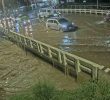DAVAO CITY, Philippines — An environmentalist group has admonished of the increasing piling up of garbage in the city, triggered by a growing population, public neglect of proper waste disposal and lack of implementation of environmental ordinances.
The group, Interface Development Interventions (IDIS) Inc. said that based on the City Environment and Natural Resources Office (Cenro) 2018 record, the city’s volume of waste generated averages 1,012 tons a day daily collection would only cover only 292 tons a day.
IDIS Policy Advocacy Officer, Amelou Dawn Catague said the problematic system of waste management was due to the lack of follow up on ordinances and the passive attitude of people.
“Many of the people, even if they are aware of the proper waste disposal become complacent in their responsibility to our environment. They thought that if they throw their garbage to the trash cans without segregation, it’s ok,” said Catague.
IDIS said it would remind the public on their waste responsibility “as the population and economy in the city is growing fast ever since President Rodrigo Duterte was elected”.
IDIS said the city’s sanitary landfill has already reached the maximum capacity level of 900,000 tons of garbage in 2016.
“Supposed to be, the landfill should only have 700,000 to 800,000 tons of garbage but through the years the garbage disposal problem has become bigger and bigger,” Catague added.
The landfill’s current the situation, according to IDIS “is very alarming” saying there was no action done to solve the problem, aside from the proposed P2.5 billion waste-to-energy incineration project through a grant from the Japanese International Cooperation Agency (JICA).
No Burn Pilipinas, along with its member pro-environmental advocates in the city, has warned about the project, however, saying some WTE projects have failed in the United Kingdom, Germany and Australia.
But environmental group Panalipdan Mindanao said “the problem of garbage in the city may also be attributed to poverty” pointing at retail packs of products consumed by the public in both urban and rural communities.
Prof. Kim Gargar told Davao Today, that emerging cities like Davao “is not alien to plastic waste as many of urban resident tend to buy retail products for their daily needs due to poverty”.
“These retail plastic containers are mostly thrown and not recycled,” said Gargar.
In 2015, the Ocean Conservancy Charity and the Mckinsey Centre for Business and Environment reported that the Philippines is the third country in Asia next to China and Indonesia to have the largest volume of discarded plastics that end up in the ocean.
The country generates a total of 2.7 million tons of plastic waste annually.
Gargar said the city has already been doing garbage collection “yet it lacks the facilities to initiate the recycling of garbage for both household and industrial use”.
While the city promotes WTE as a solution to curve down garbage problem, Panalipdan pushed to maximize local scientists to come up with a more helpful solution of garbage “that is more beneficial and eco-friendly”.










